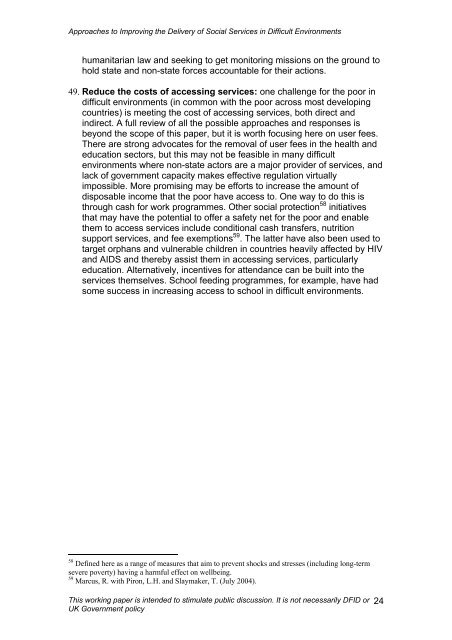Approaches to Improving the Delivery of Social Services in Difficult ...
Approaches to Improving the Delivery of Social Services in Difficult ...
Approaches to Improving the Delivery of Social Services in Difficult ...
You also want an ePaper? Increase the reach of your titles
YUMPU automatically turns print PDFs into web optimized ePapers that Google loves.
<strong>Approaches</strong> <strong>to</strong> <strong>Improv<strong>in</strong>g</strong> <strong>the</strong> <strong>Delivery</strong> <strong>of</strong> <strong>Social</strong> <strong>Services</strong> <strong>in</strong> <strong>Difficult</strong> Environmentshumanitarian law and seek<strong>in</strong>g <strong>to</strong> get moni<strong>to</strong>r<strong>in</strong>g missions on <strong>the</strong> ground <strong>to</strong>hold state and non-state forces accountable for <strong>the</strong>ir actions.49. Reduce <strong>the</strong> costs <strong>of</strong> access<strong>in</strong>g services: one challenge for <strong>the</strong> poor <strong>in</strong>difficult environments (<strong>in</strong> common with <strong>the</strong> poor across most develop<strong>in</strong>gcountries) is meet<strong>in</strong>g <strong>the</strong> cost <strong>of</strong> access<strong>in</strong>g services, both direct and<strong>in</strong>direct. A full review <strong>of</strong> all <strong>the</strong> possible approaches and responses isbeyond <strong>the</strong> scope <strong>of</strong> this paper, but it is worth focus<strong>in</strong>g here on user fees.There are strong advocates for <strong>the</strong> removal <strong>of</strong> user fees <strong>in</strong> <strong>the</strong> health andeducation sec<strong>to</strong>rs, but this may not be feasible <strong>in</strong> many difficultenvironments where non-state ac<strong>to</strong>rs are a major provider <strong>of</strong> services, andlack <strong>of</strong> government capacity makes effective regulation virtuallyimpossible. More promis<strong>in</strong>g may be efforts <strong>to</strong> <strong>in</strong>crease <strong>the</strong> amount <strong>of</strong>disposable <strong>in</strong>come that <strong>the</strong> poor have access <strong>to</strong>. One way <strong>to</strong> do this isthrough cash for work programmes. O<strong>the</strong>r social protection 58 <strong>in</strong>itiativesthat may have <strong>the</strong> potential <strong>to</strong> <strong>of</strong>fer a safety net for <strong>the</strong> poor and enable<strong>the</strong>m <strong>to</strong> access services <strong>in</strong>clude conditional cash transfers, nutritionsupport services, and fee exemptions 59 . The latter have also been used <strong>to</strong>target orphans and vulnerable children <strong>in</strong> countries heavily affected by HIVand AIDS and <strong>the</strong>reby assist <strong>the</strong>m <strong>in</strong> access<strong>in</strong>g services, particularlyeducation. Alternatively, <strong>in</strong>centives for attendance can be built <strong>in</strong><strong>to</strong> <strong>the</strong>services <strong>the</strong>mselves. School feed<strong>in</strong>g programmes, for example, have hadsome success <strong>in</strong> <strong>in</strong>creas<strong>in</strong>g access <strong>to</strong> school <strong>in</strong> difficult environments.58 Def<strong>in</strong>ed here as a range <strong>of</strong> measures that aim <strong>to</strong> prevent shocks and stresses (<strong>in</strong>clud<strong>in</strong>g long-termsevere poverty) hav<strong>in</strong>g a harmful effect on wellbe<strong>in</strong>g.59 Marcus, R. with Piron, L.H. and Slaymaker, T. (July 2004).This work<strong>in</strong>g paper is <strong>in</strong>tended <strong>to</strong> stimulate public discussion. It is not necessarily DFID orUK Government policy24
















